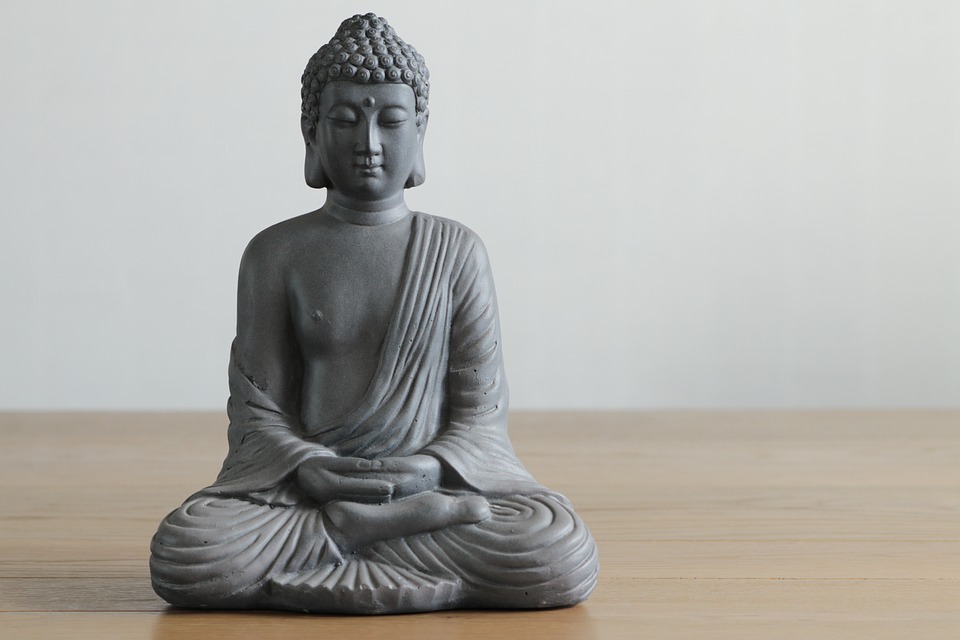4 Buddha-like Mindset – 佛系 (fó xì)
M. C. Haltek
simplified Chinese: 佛系; pinyin: fó xì
Buddha-like mindset
Fó xì or “Buddha-like mindset” is a philosophy that leads followers to abandon all desires, avoid conflicts, become apathetic or indifferent, and being zen-like. These followers have seen through the nihilistic nature of the world and its rampant materialism, thus becoming like Buddha. Fó means “Buddha” and Xì means “school.” It should be noted that despite being called Buddha-like, the phrase is not related to the Buddhist religion. Fó xì is also a buzzword used in China to describe younger generations, mostly born after the 90s and sometimes after the 80s. The term first appeared in Japan in 2014, but gained popularity in late 2017 after Xin Shixiang posted an essay titled “The First Batch of the Post-90s Generation Has Taken the Cloth” on WeChat. In 2018, the term was included in the top tenbuzzwords of the year, becoming a label.
The mindset of being less ambitious and adopting a more casual approach to life arose in response to the great pressures from society and intense competition in modern China. One way to describe fó xì is being laidback or relaxed, in contrast to the wolf-like mindset that often appears in workplace environments or the infamous Chinee college entrance exams (高考; gāokǎo).
Fó xì contains many similarities to pre-existing philosophies and cultures. It is similar to minimalism as it prefers to keep things simple and to let things be rather than to stress over it. Like Sang culture, followers of fó xì have no ambitions, desires, or goals. There is an emphasis on being indifferent and lacking motivation, as common responses to problems or provocation are “Ok”, “Sure”, and “Whatever.” This attitude can be applied to every aspect of life including careers, romance, education, and everyday activities. It has been used in the advertising industry to attract followers and attempt to get them to pursue more ambitious and active lives. There has been backlash against the fó xì mindset, as older generations have criticized this philosophy, calling Buddha-like followers lazy, pessimistic, and unambitious. The Communist Party of China (CPC) denounced the mindset as unpatriotic and detrimental to their growth as a global superpower in their newspaper, The Global Times, on January 2018.
Here is an example of how the term is used:
A: “Trying to find a job, romantic partner, excelling in school, and buying a house is so stressful.” B: “I think that fó xì is the best way to live.” A: “Agreed, let’s go nap instead.”
Here are examples of the fó xì mindset:
“Only a small number of children are going to be exceptional. Why make their childhood so difficult and stressful?”
“My boss wanted me to work on a draft until 5 am. In the end, they decided that the original was better. I simply said: ‘Sure,’ and went home.”
“It’s just a job, no need to die for it. It’s good to be neither happy nor sad.”
“How our lives will turn out is in the hands of fate or chance. Everything is a gamble, why exert any efforts?”

Citations
Besteman, Marjon. Image of Buddha. https://pixabay.com/photos/buddha-buddha-statue-spiritual-4014365/
Buddhistdoor Global. “Contemporary Chinese Buddhist Trends, Part One: What Is up with Fo-Xi?” Buddhistdoor Global, 11 Mar. 2022, https://www.buddhistdoor.net/features/contemporary-chinese-buddhist-trends-part-one-what-is-up-with-fo-xi/.
Jiahui (孙佳慧) Sun Jiahui is a freelance writer and former editor Sun. “The ‘Buddha’ Generation.” The World of Chinese, 22 Dec. 2017, https://www.theworldofchinese.com/2017/12/how-to-be-a-buddha-like-youth/.
Li, Mia. “Chinese Urban Dictionary: Foxi.” That’s Online, 5 Feb. 2018, https://www.thatsmags.com/beijing/post/22313/chinese-urban-dictionary-fo-xi.
Ng, Ernest Chi-Hin. “Are Minimalism and Fo-Xi Threatening the Consumer Economy?” Buddhistdoor Global, 8 June 2021, https://www.buddhistdoor.net/features/are-minimalism-and-fo-xi-threatening-the-consumer-economy/.
Wei, Zhou, et al. “‘佛系青年‘成热词 90后都看破红尘了吗?.” BBC News 中文, BBC, 27 Dec. 2017, https://www.bbc.com/zhongwen/simp/chinese-news-42490337#:~:text=%E2%80%9C%E4%BD%9B%E7%B3%BB%E2%80%9D%E4%B8%80%E8%AF%8D%E5%85%B6%E5%AE%9E,%E2%80%9D%EF%BC%8C%E5%B9%B6%E4%B8%8D%E9%99%90%E4%BA%8E%E7%94%B7%E5%AD%90%E3%80%82.
“Yearender-China Focus: China’s ‘Buddha-like’ Youth Quietly Accept Life for What It Is.” Edited by Liangyu, Xinhua, 28 Dec. 2017, http://www.xinhuanet.com/english/2017-12/28/c_136857895.htm.
Media Attributions
- Pixabay Buddha © Marjon Besteman is licensed under a Public Domain license

